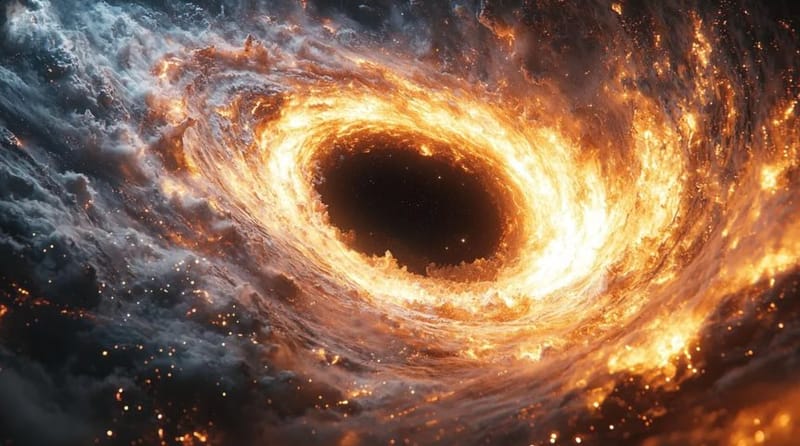Black holes are among the most mysterious and powerful phenomena in the universe. This exploration dives into their core properties: from formation and the invisible boundary of the event horizon, to the singularity where known physics collapses. We also examine the gravitational effects around these cosmic giants — time dilation, spaghettification, and Hawking radiation — while grappling with mind-bending puzzles like the black hole information paradox.
By unpacking these mysteries, we gain not only a deeper understanding of black holes themselves, but insight into the deeper laws governing reality, time, and the structure of space. As we continue to study them, black holes remain both scientific objects and symbolic gateways into the unknown.
Here are ten mind-expanding facts about black holes and the extremes of gravity and compression:
1. Singularity
At the core of every black hole is a singularity — a point of infinite density where gravity becomes infinitely strong. Space and time as we know them cease to function normally here, and the laws of physics themselves break down.
2. Event Horizon
Surrounding a black hole is its event horizon — the point of no return. Anything crossing this boundary, including light, is irrevocably pulled into the black hole. What lies beyond remains unknowable to outside observers.
“Black holes are where God divided by zero.” — Attributed to Einstein
3. Time Dilation
Gravity affects time. Near a black hole, time slows dramatically compared to an outside observer. To someone watching from a distance, objects falling into a black hole seem to freeze near the event horizon. Meanwhile, the falling object would experience time normally — a paradox of perception.
4. Hawking Radiation
Stephen Hawking proposed that black holes aren’t completely black — they emit tiny amounts of thermal radiation due to quantum effects near the event horizon. Over astronomical timescales, this could cause black holes to lose mass and eventually evaporate.
“How do we know that two and two make four? Or that gravity works?” — George Orwell
5. Gravitational Waves
When black holes collide and merge, they create ripples in space-time known as gravitational waves. These waves were first detected in 2015, confirming a prediction of Einstein’s general relativity and giving us a new way to observe the cosmos.
6. Zero Gravity
In free-fall — whether in orbit or near a black hole — you experience weightlessness. This “zero gravity” happens because you and your environment are falling at the same rate, effectively canceling the sensation of gravity.
“If you feel you are in a black hole, don’t give up. There’s a way out.” — Stephen Hawking
7. Infinite Compression
Theoretically, if you compress matter densely enough, it will form a black hole. This extreme compression challenges our understanding of matter, suggesting new questions about the limits of physical structure.
8. Black Hole Information Paradox
One of modern physics’ biggest puzzles: does information that falls into a black hole disappear forever? Quantum mechanics says information can't be destroyed, but general relativity offers no escape. This paradox lies at the heart of reconciling these two theories.
“Gravity is the first thing you don’t think.” — Attributed to Einstein
9. Supermassive Black Holes
At the heart of most galaxies, including our Milky Way, sit supermassive black holes — millions to billions of times the Sun’s mass. How they formed and grew remains a major mystery in astrophysics.
10. Spaghettification
Venture too close to a black hole and you’ll be stretched into a long, thin strand — a process dubbed “spaghettification.” This occurs because gravity is much stronger at your feet than your head, pulling you apart atom by atom.
Conclusion
Black holes stretch our understanding of time, matter, and the nature of reality. They raise profound questions: Does time end inside? Can information survive? Is there truly a point where space itself breaks?
Each discovery opens new doors — from gravitational wave astronomy to quantum gravity theories. Black holes don’t just swallow matter; they pull our curiosity toward the edge of knowledge. And perhaps, beyond.
They remind us how little we know… and how wondrous the search can be.

